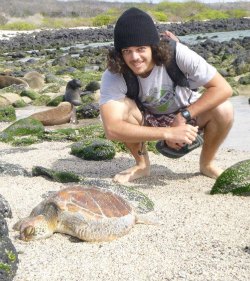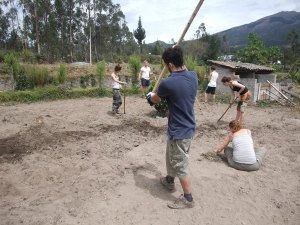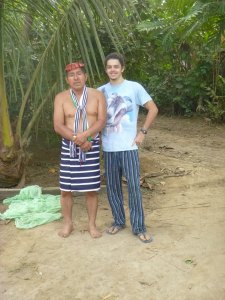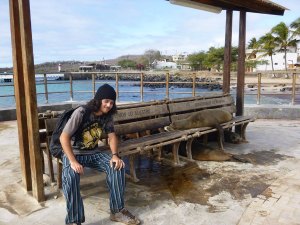Why did you decide to volunteer abroad with The Leap in Ecuador and the Galapagos Islands?

Seamus: I decided to volunteer abroad with the Leap for a couple reasons. I had always wanted to travel (especially since I grew up on a small island) and I thought volunteering would be a good way to do it.
Since I had never done anything like this before, the Leap was perfect: a group leader, others who wanted to volunteer, very good organization/scheduling of activities and overall very enthusiastic employees.
I could have gone more or less anywhere, but I chose Ecuador because I thought South America would be a good place to start, and I also wanted to improve my Spanish, which is at a conversational level.
Ecuador was just one of the countries offered by the Leap programme but it stood out to me because you could potentially volunteer in the Galapagos with this option.
I thought the program was varied enough to remain interesting as well as organized enough to maintain a diverse range of locations and activities.
What were the most challenging and rewarding aspects of the trip?

Seamus: It is difficult for me personally to think of the most challenging aspect of the trip. I'm sure everyone in my group and anyone who does the programme would have quite different answers, but I honestly never had any serious issue with any part of the trip.
I suppose the only thing that was somewhat negative was the food served by one of our hosts during the trip because it was simply served in meager quantity. I should mention that this issue was resolved by the group leader.
I suppose the most rewarding aspects of the experience for me are a combination of being enveloped in a different culture, making new friends as well as the psychological reward of working for the betterment of communities and environments.
To be more specific, it was an incredible experience for me, for example, to walk through the extensive Otavalo craft market, or to explore the adventure town of Mindo with its incredible backdrop of a smoking volcano.
It was a once in a lifetime experience to be just feet away from the Galapagos' endemic species that I had only heard about in biology class. To be frank, it was enlightening.
Ten years from now, what’s the one thing you think you’ll remember from the trip?

Seamus: Ten years from now, I will not have forgotten that I tilled a field in the Andes with an indigenous Quechwa community, or that I lived in the Jungle with a Tsachila shaman as my host.
It is hard to narrow this down, but I know for sure that living in the Galapagos for the month plus I had there (I extended my stay in Galapagos since it would otherwise have been the end of my trip) was a landmark in the landscape of my life. I had not even known that there were communities there, but they turned out to be some of the friendliest people I had ever met.
I still remember returning to the town for a jacket I had left in an internet cafe, expecting it to be gone. It was still there and the owner laughed at the fact that I even considered it might have been stolen.
I will never forget that I swam with Galapagos sharks, saw a blue-footed booby mating ceremony five feet away from me, or that I lay amongst tens of marine iguanas on a beach. A plethora of golden memories will remain with me.
What's something interesting about the Galapagos Islands that the average person doesn't know?

Seamus: One of the things that struck me the most about the Galapagos islands was just how relaxed the relationship between humans and other animals was. I had a sea lion come out of the say and go to sleep on my lap when I was lying on the beach.
I have never been anywhere else where something similar happened. This went for basically all of the animals. They really were not bothered by the people.
I also feel like the people living there genuinely understood the importance of their environment, even if they were born into it. I mentioned this elsewhere, but I really did not know there were human communities in the Galapagos until I went there.
I spent most of my time on San Cristobal because that was where I stayed and volunteered. That island had one of the nicest towns I had ever seen. It felt really safe, relaxed and positive.